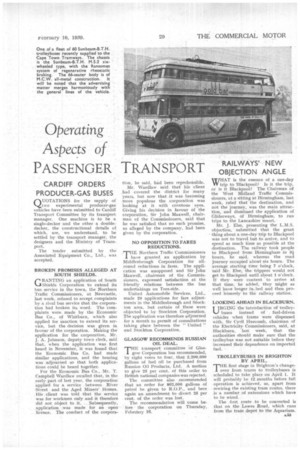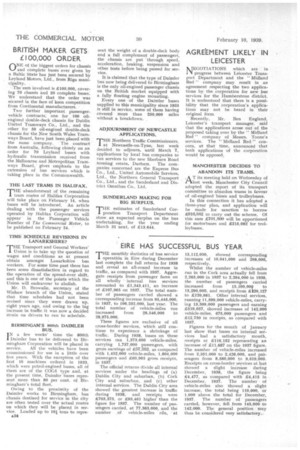Operating Aspects of
Page 59

Page 60

If you've noticed an error in this article please click here to report it so we can fix it.
PASSENGER TRANSPORT
CARDIFF ORDERS PRODUCER-GAS BUSES
QUOTATIONS for the supply of two experimental producer-gas vehicles have been submitted to Cardiff Transport Committee by its transport manager. One machine is to be a single-decker and the other a doubledecker, the constructional details of which, are, we understand, to be settled by the transport manager, the designers and the Ministry of Transport.
The tender submitted by the Associated Equipment Co., Ltd., was accepted.
BROKEN PROMISES ALLEGED AT SOUTH SHIELDS.
GRANTING an application of South Shields Corporation to extend its bus service in the town, the Northern Traffic Commissioners, at Newcastle, last week, refused to accept complaints by a rival bus service that the corporation had broken its word. The complaints were made by the Economic Bus Co., of Whitburn, which also applied for sanction to extend its service, but the decision was given in favour of the corporation. Making the application for the corporation, Mr. J. A. Johnson, deputy town clerk, said that, when the application was first heard in November, it was found that the Economic Bus Co. had made similar applications, and the hearing was adjourned so that both applications could be heard together.
For the Economic Bus Co., Mr. T. Campbell Wardlaw recalled that, in the early part of last year, the corporation applied for a service between River Street and the Aged Miners' Homes. His client was told that the service was for workmen only and it therefore did not object to it. Subsequently, application was made for an open licence. The conduct of the corpora tion, he said, had been reprehensible.
Mr. NVardlaw said that his client had covered the district for many years, but now that it was becoming more populous the corporation was looking at it with covetous eyes. Giving his decision in favour of the corporation, Sir John Maxwell, chairman of the Commissioners, said that he was satisfied that no such promise, as alleged by the company, had been given by the corporation.
NO OPPOSITION.TO FARES REDUCTIONS.
THE Northern Traffic Commissioners have granted an application by Middlesbrough Corporation for allround reductions in fares. The application was unopposed and Sir John Maxwell, chairman of the Commissioners, expressed satisfaction at the friendly relations between the bus undertakings on Tees-side.
United Automobile Services, Ltd., made 29 applications for fare adjustments in the Middlesbrough and Stockton area, but certain of these were objected to by Stockton Corporation. The application was therefore adjourned for a month to permit of consultations taking place between the " United " and Stockton Corporation.
GLASGOW RECOMMENDS RUSSIAN OIL DEAL.
THE:transport committee of Glasgow Corporation has recommended, by eight votes to four, that 2,200,000 gallons of fuel oil be purchased from Russian Oil Products, Ltd. A motion to give 25 per cent, of this order to British national companies was rejected.
The committee also recommended that an order for 802,000 gallons of petrol be given to R.O.P., and here again an amendment to divert 25 per cent, of the order was lost.
The recommendation will come before the corporation on Thursday, Februfary 111.
RAILWAYS' NEW OBJECTION ANGLE WHAT is the essence of a one-day trip to Blackpool? Is it the trip, or is it Blackpool? The Chairman of the West Midland Traffic Commissioners, at a sitting at Birmingham, last week, ruled that the destination, and not the journey, was the main attraction, and dismissed the application of Gliderways, of Birmingham, to run trips to the Lancashire resort.
Mr. J. Else, presenting the L.M.S. objection, submitted that the great thing about a one-day trip to Blackpool was not to travel but to arrive, and to spend as much time as possible at the destination. The railway took people to Blackpool from Birmingham in 31 hours, he said, whereas the road journey occupied about six hours. The average starting time being 7 o'clock, said Mr. Else, the trippers would not get to Blackpool until about I o'clock, If they were content to arrive at that time, he added, they might as well have longer in. bed arid then proceed leisurely to the railway station.
URGING the introduction of trolleybuses instead of . fuel-driven vehicles when trams were dispensed with, Sir Cyril Hurcornb, chairman of the Electricity Commissioners, said, at Blackburn, last week, that the authorities should make sure that the trolleybus was not suitable before they increased their dependence on imported fuel.
LOOKING AHEAD IN BLACKBURN.
TROLLEYBUSES IN BRIGHTON BY APRIL.
THE first stage in Brighton's change'. over from trams to trolleybuses is scheduled to take place on April 1. It will probably be 12 mouths before full operation is achieved, as, apart from rewiring the existing tram routes, there is a number of extensions which have to be wired.
The first route to be converted is that on the Lewes Road, which runs from the tram depot to the Aquarium.
BRITISH MAKER GETS £100,000 ORDER
ONE of the biggest orders for chassis and complete buses ever given by a Baltic State has just been secured by Leyland Motors, Ltd., from Riga municipality.
The sum involved is £100,000, covering 70 chassis and 20 complete buses. We understand that the order was secured in the face of keen competition from Continental manufacturers.
Two further important passengervehicle contracts, one for 100 oilengined double-deck chassis for Dublin United Tramways Co„ Ltd., and the other for 50 oil-engined double-deck chassis for the New South Wales Tramways Board, have just been placed with the same company. ' The contract from Australia, following closely on an order for 70 Leyland buses with hydraulic transmission received from the Melbourne and Metropolitan Tramways Board, gives emphasis to the extension of bus services which is taking place in the Comnionwealth.
THE LAST TRAMS IN HALIFAX.
r-r-HE abandonment of the remaining 1 tram routes of Halifax Corporation will take place on February 14, when buses will be introduced. An article dealing with the passenger services operated by Halifax Corporation will appear in the Passenger Vehicle Number of The Commercial Motor, to be published on February 24.
TIME SCHEDULE REVISIONS IN LANARKSHIRE?
THE Transport and General Workers' Union is to take up the question of wages and conditions as at present obtain amongst Lanarkshire bus workers. For some time past there has been some dissatisfaction in regard to the operation of the spread-over shift, and this is one of the points which the Union will endeavour to abolish.
Mr. I). Brownlie, secretary of the Wishaw branch of the Union, stated that time schedules had not been revised since they were drawn up, eight years ago, and owing to the big increase in traffic it was now a decided strain on drivers to run to schedule.
BIRMINGAM'S 800th DAIMLER BUS. I N a few weeks' time the 800th Daimler bus to he delivered to Birmingham Corporation will be placed in
service. All the vehicles have been commissioned for use in a little over five years. With the exception of the first 10 machines ordered in 1933, which were petrol-engined buses, all of them are of the COGS type and, at the present time, Daimler buses represent more than 80 per cent. of Birmingham's total fleet.
Owing to the proximity of the Daimler works to Birmingham, bus chassis destined for service in the city are often tested over the actual routes on which they will be placed M service. Loaded up to 10/ tons to repre A34 sent the weight of a double-deck body and a full complement of passengers, the chassis are put 'through speed, acceleration, braking, suspension and other tests before being passed for service.
It is claimed that the type of Daimler bus now being delivered to Birmingham is the only oil-engined passenger chassis on the British market equipped with a fully floating engine mounting.
Every one of the Daimler buses supplied to this municipality since 1933 is still in service, some of them having covered more than 250,000 miles without a breakdown.
ADJOURNMENT OF NEWCASTLE APPLICATIONS.
THE Northern Traffic Commissioners, at Newcastle-on-Tyne, last week decided to adjourn, until March 7, applications by local bus companies to run services to the new Sherburn Road housing estate, Durham. The companies concerned are the Express Bus Co., Ltd., United Automobile Services, Ltd., the Northern General Transport Co., Ltd., and the Sunderland and District Omnibus Co., Ltd.
SUNDERLAND MAKING FOR BIG SURPLUS.
THE estimates of Sunderland Corporation Transport Department show an expected surplus on the bus undertaking, for the year ending March 31 next, of £13,644.
AGREEMENT LIKELY IN LEICESTER
r‘JEGOTIATI02,IS which are in
'(I progress between Leicester Transport Department and the " Midland Red" company may result in an agreement respecting the two applications by the corporation for new hus services for the Humberstone district. It is understood that there is a possibility that the corporation's applications may not he heard in their original form.
Recently, Mr. Ben England, Leicester's transport manager, said that the applications arose out of the proposed taking over by the "Midland Red " company of Messrs. Toone's services. The "'Midland Red" concern, at that time, announced that both applications of the corporation would be opposed.
MANCHESTER DECIDES TO ABANDON ITS TRAMS.
.A T its meeting held on Wednesday of ini.last week, Manchester City Council adopted the report of its transport committee to abandon trams in favour of oil-engined buses and trolleybuses.
In this connection it has adopted a three-year plan, and application will be made for sanction to borrow £016,882 to carry out the scheme. Of this sum 4701,800 will be apportioned for motorbuses and £215,082 for trolleybuses.




























































































